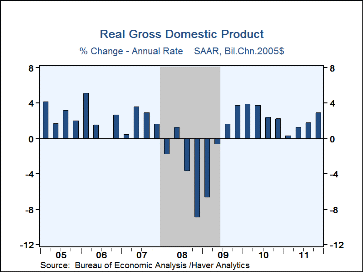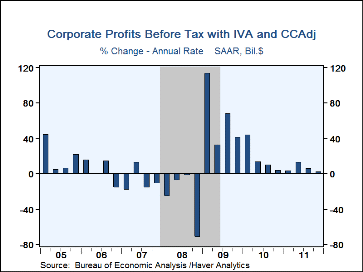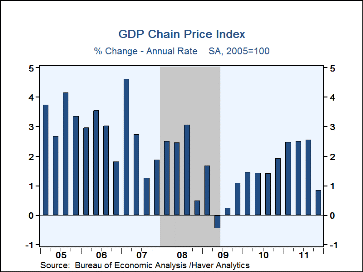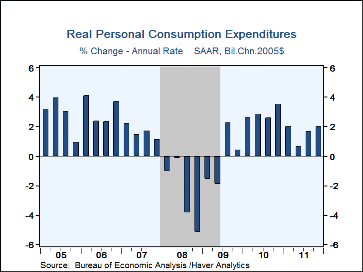 Global| Mar 29 2012
Global| Mar 29 2012U.S. 3.0% GDP Growth Estimate Unchanged; Profit Growth Declines
by:Tom Moeller
|in:Economy in Brief
Summary
Economic growth of 3.0% (SAAR) last quarter was unrevised, as expected, in the Commerce Department's 3rd estimate. Growth remained the firmest since Q2'10. Despite this slight improvement, annualized corporate profit growth amounted [...]
Economic growth of 3.0% (SAAR) last quarter was unrevised, as expected, in the Commerce Department's 3rd estimate. Growth remained the firmest since Q2'10. Despite this slight improvement, annualized corporate profit growth amounted to a lesser 3.5% (7.0% y/y). For the full year, profit growth slowed to 7.9% from 32.2% in 2010. The slowdown resulted from a decline in profits abroad at a 32.0% rate (+9.8% y/y) in Q4. For the year, however, growth doubled to 12.3%. For domestic nonfinancial industries, annualized profit growth of 10.8% (15.1% y/y) last quarter improved. However, for the full year profits slowed to 12.3% versus 48.2% in 2010. Financial industry earnings grew at a 31.0% rate last quarter (-10.5% y/y) but they fell 4.7% for all of 2011. Overall after-tax profits without IVA and CCA fell at a 2.0% annual rate (+11.7% y/y) and full-year growth slowed to 5.1%, its least since 2008.
A little-changed 1.8 percentage point contribution to GDP growth from faster inventory accumulation remained the main impetus to the economy's advance. That contribution followed a subtraction from growth during three of the prior four quarters. Foreign trade subtracted a slightly changed 0.3 percentage points from growth as exports rose at a 2.7% annual rate (4.7% y/y) and imports rose 3.7% (3.6% y/y).
Domestic final sales growth was unrevised at 1.1% (1.5% y/y) as business fixed investment grew a slightly strengthened 5.2% (8.2% y/y). Growth in personal consumption expenditures of 2.1% (1.7% y/y) was unchanged and still the weakest gain since Q1'10. Residential investment growth also remained at 11.5% (3.5% y/y) and was the strongest since Q2'10 when growth was fueled by a government subsidy to home buyers. The decline in government spending was little-changed at -4.1% (-2.8% y/y).
Price inflation as measured by the chain-weight price index was unchanged at 0.9% and was still the weakest since Q3'09. The PCE price index rose at a modest 1.2% rate (2.7% y/y). However, full-year growth in the index of 2.7% was the strongest since 2008 due to strength in food and energy prices.
The latest GDP figures can be found in Haver's USECON and USNA databases; USNA contains basically all of the Bureau of Economic Analysis' detail on the national accounts, including the new integrated economics accounts and the recently added GDP data for U.S. Territories. The Consensus estimates can be found in AS1REPNA.
Estimating Probabilities of Recession in Real Time Using GDP and GDI from the Federal Reserve Board can be found here.
| Chained 2005 $,% AR | Q4'11 (3rd Est) |
Q4'11 (2nd Est) |
Q4'11 (Adv) |
Q3 11 |
Q2 11 |
Q4'11 Y/Y |
2011 | 2010 | 2009 |
|---|---|---|---|---|---|---|---|---|---|
| Gross Domestic Product | 3.0 | 3.0 | 2.8 | 1.8 | 1.3 | 1.6 | 1.7 | 3.0 | -3.5 |
| Inventory Effect | 1.8 | 1.9 | 1.9 | -1.4 | -0.3 | 0.1 | -0.2 | 1.6 | -0.9 |
| Final Sales | 1.1 | 1.1 | 0.8 | 3.2 | 1.6 | 1.5 | 1.9 | 1.4 | -2.6 |
| Foreign Trade Effect | -0.3 | -0.1 | -0.1 | 0.4 | 0.2 | 0.1 | 0.1 | -0.4 | 1.0 |
| Domestic Final Sales | 1.3 | 1.1 | 0.9 | 2.7 | 1.3 | 1.4 | 1.8 | 1.8 | -3.6 |
| Demand Components | |||||||||
| Personal Consumption | 2.1 | 2.1 | 2.0 | 1.7 | 0.7 | 1.7 | 2.2 | 2.0 | -1.9 |
| Business Fixed Investment | 5.2 | 2.8 | 1.7 | 15.7 | 10.3 | 8.2 | 8.8 | 4.4 | -17.9 |
| Residential Investment | 11.7 | 11.5 | 10.9 | 1.2 | 4.2 | 3.5 | -1.3 | -4.3 | -22.2 |
| Government Spending | -4.1 | -4.4 | -4.6 | -0.1 | -0.9 | -2.8 | -2.1 | 0.7 | 1.7 |
| Chain-Type Price Index | |||||||||
| GDP | 0.9 | 0.9 | 0.4 | 2.6 | 2.5 | 2.1 | 2.1 | 1.2 | 1.1 |
| Final Sales of Domestic Product | 0.9 | 0.9 | 0.4 | 2.6 | 2.5 | 2.1 | 2.1 | 1.2 | 1.0 |
| Final Sales to Domestic Purchasers | 1.1 | 1.1 | 0.8 | 2.0 | 3.4 | 2.6 | 2.5 | 1.5 | -0.1 |
Tom Moeller
AuthorMore in Author Profile »Prior to joining Haver Analytics in 2000, Mr. Moeller worked as the Economist at Chancellor Capital Management from 1985 to 1999. There, he developed comprehensive economic forecasts and interpreted economic data for equity and fixed income portfolio managers. Also at Chancellor, Mr. Moeller worked as an equity analyst and was responsible for researching and rating companies in the economically sensitive automobile and housing industries for investment in Chancellor’s equity portfolio. Prior to joining Chancellor, Mr. Moeller was an Economist at Citibank from 1979 to 1984. He also analyzed pricing behavior in the metals industry for the Council on Wage and Price Stability in Washington, D.C. In 1999, Mr. Moeller received the award for most accurate forecast from the Forecasters' Club of New York. From 1990 to 1992 he was President of the New York Association for Business Economists. Mr. Moeller earned an M.B.A. in Finance from Fordham University, where he graduated in 1987. He holds a Bachelor of Arts in Economics from George Washington University.
More Economy in Brief
 Global| Feb 05 2026
Global| Feb 05 2026Charts of the Week: Balanced Policy, Resilient Data and AI Narratives
by:Andrew Cates










